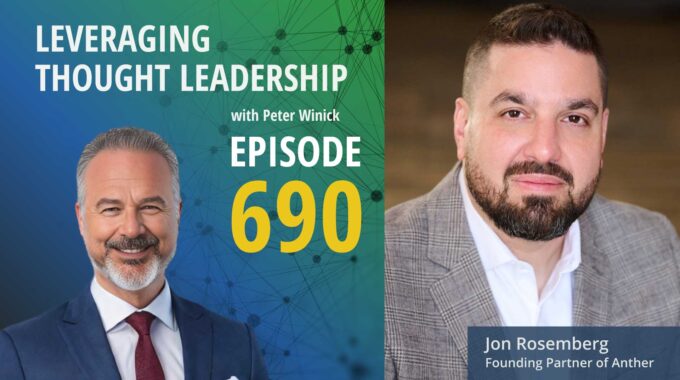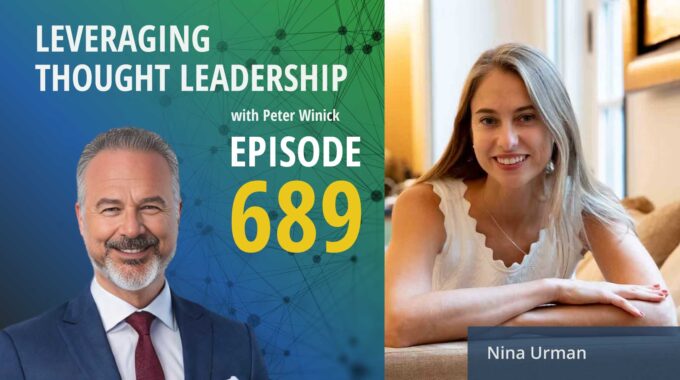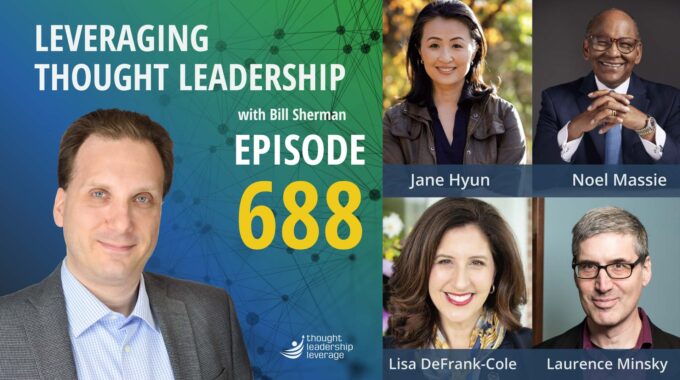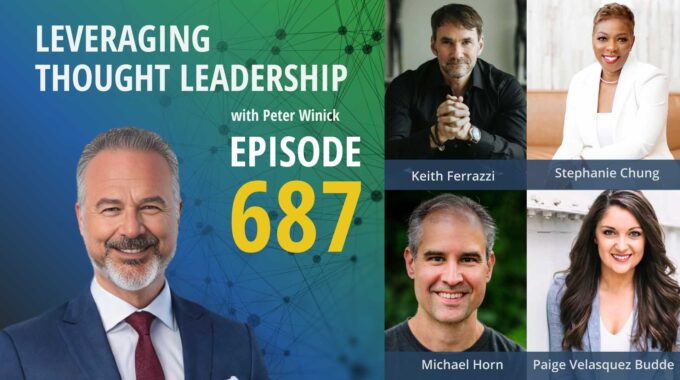A practical framework for leaders who want clarity and performance This episode defines thriving at…
Improving Thought Leadership Through Pragmatism and Serving Others | Doug Conant
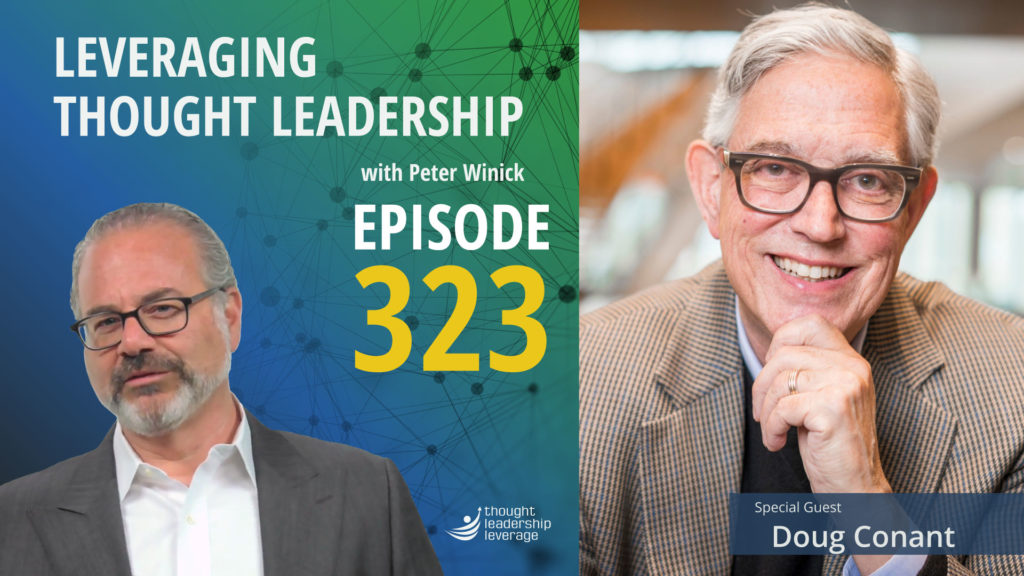
Using thought leadership to find what matters most and improve leadership.
An interview with Doug Conant about the “sacred ground” of leadership, pragmatism, and stopping to reflect on the things that matter most.
Our guest today is internationally renowned business leader, Doug Conant. Doug is the best-selling author of The Blueprint, an eminently smart and practical guide to leadership that contains 6 content-rich steps to creating a richer, fuller, more elevated professional life. With more than 40 years of leadership experience at first-class companies like Campbell Soup and Nabisco, Doug now focuses on thought leadership as the Founder and CEO of Conant Leadership.
In today’s episode, Doug shares his passion about his life’s work in thought leadership, and how he implemented positive, meaningful change at Campbell Soup Company. Years after he began, he chose to leave the corporate world and move into thought leadership full-time. Now, he is using his experience and expertise to help leaders world-wide.
Doug tells us about his legacy of contribution, and the ways in which he is inspired to transcend the ordinary and elevate new, innovative ideas. He talks to us about his book, The Blueprint. Then, Doug explains how following a few simple steps can help leaders “up their game” by focusing on ways to constantly elevate their interactions.
Doug and Peter discuss the need to take time for reflection and study; how to know what matters most; and how to change small things to get big impact. Great leaders are pragmatic about where they spend their time, focusing on the things that matter the most in order to see the biggest – and best – return for their efforts! If you’ve been looking for ways to increase your focus and bring innovative ideas about leadership into your life, this is the episode for you!
Three Key Takeaways:
- Leadership is “sacred ground,” where you affect people’s lives and livelihoods. Great thought leadership should improve the quality of leaders in order to change a myriad of lives.
- Thought leaders need to be meditative about their time and their goals, focusing on the things that matter the most!
- When seeking to improve as a Thought Leader, seek out role models, pay attention to those who had a profound positive impact on you. Actively follow the leadership they’ve shown – as you develop your own path!
If you need a strategy to bring your thought leadership to market, Thought Leadership Leverage can assist you! Contact us for more information. In addition, we can help you implement marketing, research, and sales. Let us help you so you can devote yourself to what you do best.
Transcript
Peter Winick And welcome, welcome, welcome, this is Peter Winick, I’m the founder and CEO of Thought Leadership Leverage, and you’re joining us on the podcast today, which is Leveraging Thought Leadership today. My guest is Doug Conant. Doug is and let me go by the bio here because I don’t want to miss anything. There’s so much good stuff. So Doug is an internationally renowned business leader, New York Times and Wall Street Journal bestselling author, keynote speaker, social media influencer with over 40 years of leadership experience at world class companies. I’ll fast forward to the highlights President Nabisco Foods, then CEO of Campbell Soup, chairman of Avon Products, and then he launched Content Leadership, a mission driven community of leaders and learners, for championing leadership that works in the 21st century. And he’s got a new book out, and I am proud to call him someone that I know and have admired for many, many years. I’m excited, Doug, so let’s sort of dive in here. Oh, so there’s a lot of paths you could have taken right after an illustrious career. You could have done the easy thing, right? You know, play golf, chill out, relax beaches, Maui. But no, no, no. That’s not the path we went. Now we want to start sort of this thought leadership journey. If we go back about 10 years, what was driving you to do that? What was the burning sort of need to do that?
Doug Conant Well, Peter, first, thanks for having me on. And you know, this passion for thought leadership has been with me my whole life. So this is a natural step. I was providing thought leadership. I created a CEO institute when I was CEO at Campbell for our high potentials, and I literally taught the class for two years to each group. Over six years, I taught our seventy-five high po’s, all about leadership, my philosophy, about leadership that works in the 21st century. So. It was a natural segue when I left the corporate world to step into the thought leadership world around the concept of leadership because quite frankly, we’re not doing well enough, we have to do better. I have a strong point of view that that we can do better, that when you when you start thinking about leadership, you start thinking about being on sacred ground. My language it.
Peter Winick Sure.
Doug Conant And you are affecting people’s lives and their livelihoods. They wake up and they’re thinking about going to work for you. And then they’re having breakfast. And while they’re feeding their kids, they’re thinking about, what do I have to do today for the enterprise? Then they go work all day, which may be in the bedroom next door. But if they’re working remotely but they’re thinking all day about work, they take a break. They see their kid, they walk the dog, they go back to work. Then they have dinner. They take a break at, see their kids put on a bed and then they go back to work again. You have the most profound impact as a leader on the lives of these people. Mm hmm. So than anyone else, and I just feel that leaders have to take that responsibility seriously and they just have to do better. And I have a approachable thought for how they can do that. So I’ve been practicing and preaching this for years.
Peter Winick But I want to go back to something that you said that I think is interesting. Some people transition into thought leadership. Now I’m at a stage of my life, right? I’m maybe I’m an academic, maybe I’m a consultant, maybe I’m a CEO and or starting out whatever. I’m going to be a thought leader. The way you answer that question was really interesting saying without a paraphrase here. Well, I always was a thought leadership, a thought leader. And now once I left sort of the C-suite, I just took off a bunch of other hats and chose to focus exclusively on this sort of piece of my world. Is that a fair report there?
Doug Conant I was always a thinker. I don’t know that I was a thought leader when I was more junior. I’m not sure I had the courage of my convictions sufficiently and that which is understandable. Most of us don’t. But as I experience just about everything you could experience in the corporate world, I mean, I spent 10 years as part of basically KKR right after Barbarians at the Gate and Nabisco. I mean, you were, right,
Peter Winick You were there at the LBO.
Doug Conant That highlighted afterwards was brought in to start to help a team of people get it back on its feet. But it was tough sledding and ugly stuff, and so I was always thoughtful, but I didn’t have the courage of my convictions to do all I could have done.
Peter Winick So stayed there for a second because I – that’s critical. So people ask me all the time because this is my lane, how I define thought leadership. So there’s to me, it’s fairly simple. There’s the thoughtfulness, right, that can be based on your experience. It could be based on data. There’s lots of ways to be thoughtful, and a lot of people aren’t thoughtful. The other piece is the leadership, and I call it sort of courage of convictions, but it’s a similar piece having the courage to lead the domain or the area that you’re practicing in, into new areas, into different areas to asked him to think a little bit differently, not just to regurgitate. Here’s the five best practices of leadership, and by the way, not everyone needs to agree with you, and that’s where the courage come with it, right? I can look at it and say, No, I call, you know, based on that, I don’t believe what you believe. Great. Let’s have a conversation about, right? Right.
Doug Conant Well, you’re absolutely right. I agree with the thoughtfulness and the leadership piece. To me, leadership is all about. It’s the art and the science of leading people in a specific direction. You’re trying to influence them, influencing them in their action. And if you’re, if you’re, if you’re really an action-oriented thought leader, you’re moving forward. I’ve heard a lot of thought leaders that just want to think and lead people deeper into an issue, but aren’t necessarily moving it forward.
Peter Winick But that’s the theoretical versus the applied, right? As a CEO, you don’t have the luxury of staying in the theoretical for long.
Doug Conant No, you don’t. I mean, if you’re a CEO, you’ve got three years to be outside the first year. The other guy’s fault. The second year we’re learning. And the third year, it’s your fault. So, you know, as a CEO and most, you got three years.
Peter Winick So the three envelopes, you’re right. That’s like the joke of the three envelopes with the CEO gives to his successor. There’s three envelopes in there that will tell you everything. And exactly you go. Yeah. Let me ask you this then. So at this stage, I would assume you’re doing this out of passion. Right? So I find in my work with thought leaders from around the world, there’s typically three things that motivate and drive them. For some, it’s money. Money is either super important, not important at all. Moderately important for some, ego is one of the influencers like it, and I don’t mean ego in a in a narcissistic bad way, but it is gratifying when people sort of embrace your work and take action on it and it changes the way they think. And then there’s this sort of evangelical piece like part of the reason I’m on the planet is to unleash the power of these ideas because it alleviates suffering. It helps people see the world a different way, etc. How would you sort of react to that?
Doug Conant Well, it’s certainly not for the money. I don’t get paid for what I do. Right. And we charge for a few things that currently I don’t take any salary. We charge for a few things that current leadership which cover our operating cost and then we give everything else away. So this is definitely not for the money. Yeah. You know, I sort of. It is important to me as a person. I think I’m working my Maslow’s hierarchy every day and I’m probably moving up into the self-actualization phase at the peak of the pyramid where I want to leave a legacy of contribution that feels special to me and that transcends the ordinary. That’s my language, and that’s what I’m trying to do. But I must say it’s really built around the concept of serving others. Very service-oriented content leadership is all about helping people find their own way. So we’re really not evangelizing a specific brand of leadership. What we’re evangelizing is the notion that every leader needs to lift their game in a way that works for them. You know, no two leaders are alike. Think of all the leaders you’ve had on this show, and they’re all different. None of them tried to fit into a cookie cutter. I guarantee. I mean, maybe they tried, but ultimately, they fell in. What is Bill? George said. Change the world. You have to change yourself. I would say you have to become a best version of yourself, but. Most of them, all those leaders that you’ve talked to, I’m sure, have their own unique approach that works for them.
Peter Winick Were inspiring and you know, and you mentioned this earlier, you know, by being a lifelong learner. It’s never done. It’s never OK. I did that leadership thing. Check the box and I know all there is to know and now I can just move forward. It’s always changing. It’s always dynamic. It’s always being influenced in a positive way by somebody else’s thoughts. And that’s interesting to me. How does that? How does that change much more?
Doug Conant In fact, we have a six-step process that we help leaders go through in a couple of days. But the six step the last step is an improvement step. And the question you ask yourself every day is how can I do better? It’s all about continuous improvement. And we tell people, forget perfection. Forget perfection. You just want to do a little better tomorrow than you did today, and you can do that. And this is an approachable, practical way to take on the challenge of becoming the best version of yourself.
Peter Winick Got it.
Doug Conant So what I have brought to this leadership discussion in today’s world is a process and a degree of pragmatism from someone who’s been there for 40 years, slogging away entry level all the way up to the chairman.
Peter Winick Yep. And in the state of pragmatism,
Doug Conant I’m to go get an executive MBA at Harvard for every aspiring leader. You know, you actually have to be able to fit it into your cockamamie life. And then you have to do a little better tomorrow than you did today.
Peter Winick If you’re enjoying this episode of Leveraging Thought Leadership, please make sure to subscribe. If you’d like to help spread the word about our podcast, please leave us a review and share it with your friends. We’re available on Apple Podcasts and on all major listening apps, as well as at ThoughtLeadershipLeverage.com/podcasts.
Peter Winick You’ve got actually a couple of things along the way, so stay with the pragmatic element for a minute because and again, through the lens of thought leadership over the last 10 years, when you know and I’m using that mark since you gave up the CEO gig, right, is that I’m assuming that took up some, if not most, if not almost all of your time, right? Even to be a thought leader today, it’s so easy to be pulled in a thousand directions or distracted or not focused or whatever, but that pragmatism of here’s how I’m going to allocate my time to research. Here’s how I’m going to allocate my time to serving clients. Here’s to allocate my time to speaking. How do you sort of deal with that, given that your and I love the way you frame sort of the Maslow piece sort of at that the luxury of that highest, highest level of the pyramid? So how do you pragmatically balance the time issue?
Doug Conant Steven Covey had a lot of great lines, but the one that I remember, the two that I remember that pertain to this discussion is the first one is things that matter. Most must never be at the mercy of things that matter least. And it’s up to you as a leader to figure out what matters most. The other line that connects to that is it’s easy to say no to things. If there’s a greater yes, burning within and both those cases, it’s focusing on what’s the greater yes within you that’s burning within that you want to say yes to? Hmm. And I think it takes reflection and study in moderate doses to get to a place where you know yourself well enough. So that you know what matters most, and then all of a sudden, it gets very easy to say no to all these other things because there’s
Peter Winick So, so let me push on that in again. So I agree with everything that you said and reflection and study at a minimum in moderate ways. Sometimes if you have the luxury to be more than moderate, great.
Doug Conant And the more the better. But you’ve got to you’ve also got to walk in the world with other people.
Peter Winick Exactly. But my point is, if you look at your typical high po or middle manager or emerging leader or whatever, taking that time to reflect and study when you look at your calendar, there’s not 32 calls booked in seven flights here. If we weren’t living in Covid. You know, people typically don’t put on their calendar, you know, Tuesday afternoon from two to five, leave me alone, I’m reflecting. Like, how do you find the time to do that? And it sounds trivial, but I think it’s something that’s
Doug Conant It’s real. It’s huge.
Peter Winick It’s real and people build themselves up. Get to it, you know?
Doug Conant Well, if all the work on habits, if you read James clear work and or NEG or several others they talk about, tiny habits can have enormous depth. So what we I wrote, I wrote the book on this. That’s what the blueprints are all about. It’s how do you fit this leadership development component into the middle of your cockamamie life when you have no time to do anything right? But you hunger to do better. Your hunger to do better, but you don’t know how, you know, it doesn’t fit into my life. And so that’s the whole point of this book, The Blueprint, because if this is the pragmatism part, if it doesn’t fit into your cockamamie life, if it doesn’t nest perfectly cockamamie life, you’re not going to sustain it. It’s like when you talk about, I’m going to go on a diet in January, right? And the diet doesn’t quite fit your lifestyle, right? It may be. You hang on through February. By March you’ve given up.
Peter Winick Yeah, totally OK. What do you think that that reflection piece? So I think that we’re all we’ve all gotten good, if not too good at being so productive and so efficient. I can multitask and I could, you know, juggle while riding a unicycle and, you know, doing a balance sheet or whatever, whatever the equivalent is. Reflection is hard because it’s almost the antithesis of the way most of us are working, most of the time. Just really stopping. And you know, there isn’t a word for you tasking anymore.
Doug Conant Reflecting the, you know, the concept here is pretty simple. Most of us lead our leadership lives by the seat of our pants.
Peter Winick Yeah, that’s where I’m going.
Doug Conant And that’s not good enough. You owe people more than we’re talking about sacred ground, trying to help people live lives that are meaningful, and we’re doing all this by the seat of our pants. I guarantee you when you started your first podcast, you were doing it by the seat of your pants.
Peter Winick Maybe the 10th or 20th!
Doug Conant Now you’ve gotten good at it, you’ve worked at it right with intention. You said, What’s working here? What’s not working? How can I do this a little bit better tomorrow than I did today? And you’ve become really proficient at it? The same thing is true about leadership. You have to find a way to reflect in ways that work for you. And we go through this in the blueprint that you have to find a way to bring it to life in small increments that you can handle in the middle of your cockamamie life. Mm-Hmm. Intense in a in a more intentional way. Now, all of us, myself included. Seventy five percent of my day is by the seat of my pants. I’m just reacting to all the crap that’s coming at me. But I got to tell you, I got twenty five percent of my day conceptually or my energy anyway. That where I have the rudder in the water and I know where I’m headed and what about it? That’s what I was looking for leaders today. If they just get 25 percent of their energy focused on what matters most to them, then they can fill in with all the other seventy five percent seat of the pants stuff that we all have to do when the internet goes down or the sitter doesn’t show up or whatever it is.
Peter Winick And I think what? Part of what I heard between the words there is, if you’re not going to do it for yourself because that feels selfish as a leader, it’s the sacred ground of obligation you have to others. So you’re doing that reflection, not for you, but for the others that you lead might help people.
Doug Conant Yes and no. Yes and no, because what you’re doing is you’re creating a framework for thinking about leading others that’s fulfilling to you. Sure, you’re because you’re
Peter Winick and you’re not leading with the you. You’re leading with the others, is what I’m saying.
Doug Conant Yeah, you’re influencing others, but you’re the beauty of this is and the only way it’s sustaining is it’s got to be a win. It has to work for you. You have to show up authentically. Got it. You have to know what authentic looks like. Most leaders don’t. They haven’t invested the time to think about it. Another great Bernie Brown quote, it was my quote of the year in 2020. You can either walk inside your story and own it, or you can stand outside of your story and hustle for your worthiness every day. I love that. You know, when I was growing up, I was walking inside my parents’ story form and my teachers and then my coaches. And then when I got to graduate school, my professors and then my bosses, and it took until I got fired in my early thirties to say, you know, I’m not walking inside my story. I wish I’d known the words then. And I started on this journey at the age of maybe thirty-two, and I’ve been trying to figure my story out in little ways, and I’m now almost 70, so we’re talking thirty-eight years of working it through in little ways that have allowed me to feel a little bit better about what I’m doing today than I did yesterday most days. And it’s the only way I just don’t believe it works any other way. I don’t believe all of a sudden you have an epiphany. OK, here I go. Exactly. You’re on a path that works for you that helps take you to a place where you can be effective as a leader and fulfilled. It’s got to work both ways. Otherwise, it’s just there’s no evidence to me that it’s sustainable.
Peter Winick No, that’s fine. So as we close out, Doug, one final sort of thought someone out there, I hope I think is sitting in a similar situation to where you might have been 10 or 15 years ago, right during the transition, thinking about a transition, leaving act, selling the business, blah blah blah. And this this thought leadership stuff, whether they’re using that word or not, is part of their fabric or part of what drives them. What would you recommend they think about or ponder if they want to focus a good chunk of their that next phase of their life to it?
Doug Conant Well, the first thing I would say is buy the blueprint, but the second thing I actually mean that. But when I lost my job. My outplacement console, who’s crusty old New Englander got left for dead and they are gone forest in World War Two and walked with a limp for the rest of his life. He was a tough son of a gun. The first thing you had me do when I went through outplacement, I was Doug, I want you to handwrite your entire life story. Everything. Everything. And I said, what does that have to do with anything? And he said it has everything to do with it and you’ll see why. So I spent two weeks. Fortunately, I was out of a job, so I have lots of time and wrote my life story. It was about 50 pages. Both sides handwritten. And he wanted it handwritten. You know, some people are going to say, that’s crazy, I’m not going to do that. Write your life story and then draw conclusions from it. I guarantee you will get anchored in what matters most to you just through that exercise. I love it. One other thing to do after you do that, then think about the people who have had the most profound influence on you, whoever they are. And then I’ll tell you. Bottom line, you’re going to find that they had very high standards for you and that they cared about you. And then what I would say is be a little bit more like those people with the people with whom you live and work and you’ll be fine. Write your life story. Be more like the people who had a profound influence on you. You know what great leadership looks like? You experienced it with those people. And be more like them with the people with whom you live and work, and you’re going to be fine if you want to be really good by the blueprint?
Peter Winick Got it! Well, thank you so much. I appreciate your time. I appreciate your work. I’ve been a admirer of your work for many years and will continue to do so. Thank you for spending some time with us today. To learn more about Thought Leadership Leverage, please visit our web site at ThoughtLeadershipLeverage.com to reach me directly. Feel free to email me at Peter at ThoughtLeadershipLeverage.com and please subscribe to Leveraging Thought Leadership on iTunes or your favorite podcast app to get your weekly episode automatically.



